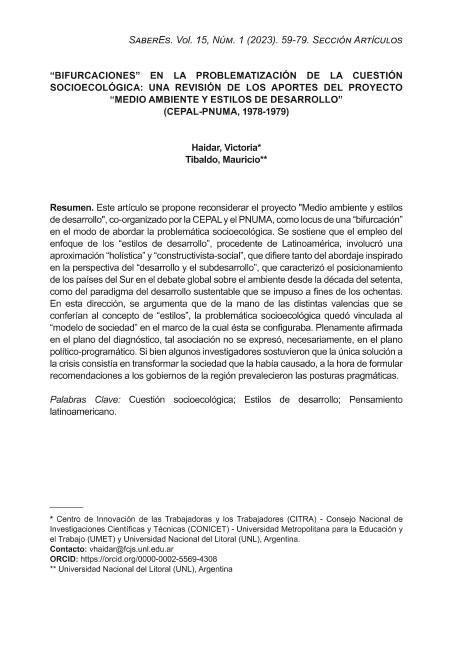Artículo
Este artículo se propone reconsiderar el proyecto Medio ambiente y estilos de desarrollo, co-organizado por la CEPAL y el PNUMA, como locus de una bifurcación en el modo de abordar la problemática socioecológica. Se sostiene que el empleo del enfoque de los estilos de desarrollo, procedente de Latinoamérica, involucró una aproximación holística y constructivista-social, que difiere tanto del abordaje inspirado en la perspectiva del desarrollo y el subdesarrollo, que caracterizó el posicionamiento de los países del Sur en el debate global sobre el ambiente desde la década del setenta, como del paradigma del desarrollo sustentable que se impuso a fines de los ochentas. En esta dirección, se argumenta que de la mano de las distintas valencias que se conferían al concepto de estilos, la problemática socioecológica quedó vinculada al modelo de sociedad en el marco de la cual ésta se configuraba. Plenamente afirmada en el plano del diagnóstico, tal asociación no se expresó, necesariamente, en el plano político-programático. Si bien algunos investigadores sostuvieron que la única solución a la crisis consistía en transformar la sociedad que la había causado, a la hora de formular recomendaciones a los gobiernos de la región prevalecieron las posturas pragmáticas. This article intends to reconsider the Environment and Development Styles project, co-organized by ECLAC and UNEP, as the locus of a “bifurcation” in the way of approaching socio-ecological problems. It is argued that the use of the "development styles" approach, coming from Latin America, involved a "holistic" and "social-constructivist" approach, which differs so much from the approach inspired by the "development and underdevelopment" perspective, that characterized the position of the countries of the South in the global debate on the environment since the 1970s, as the paradigm of sustainable development that was imposed at the end of the 1980s. In this direction, it is argued that hand in hand with the different valences that were conferred on the concept of "styles", the socio-ecological problem was linked to the "model of society" in the framework of which it was configured. Fully affirmed at the diagnostic level, such an association was not necessarily expressed at the political programmatic level. Although some researchers argued that the only solution to the crisis was to transform the society that had caused it, when formulating recommendations to the governments of the region, pragmatic positions prevailed.
“Bifurcaciones” en la problematización de la cuestión socioecológica: una revisión de los aportes del proyecto “Medio ambiente y estilos de desarrollo” (CEPAL-PNUMA, 1978-1979)
Título:
"Bifurcations" in the problematization of the socioecological issue: a review of the contributions of the project "Environment and styles of development" (ECLAC-PNUMO, 1978-1979)
Fecha de publicación:
07/2023
Editorial:
Universidad Nacional de Rosario
Revista:
SaberEs
e-ISSN:
1852-4222
Idioma:
Español
Tipo de recurso:
Artículo publicado
Clasificación temática:
Resumen
Archivos asociados
Licencia
Identificadores
Colecciones
Articulos(CITRA)
Articulos de CENTRO DE INNOVACION DE LOS TRABAJADORES
Articulos de CENTRO DE INNOVACION DE LOS TRABAJADORES
Citación
Tibaldo, Mauricio Ezequiel; Haidar, Victoria; “Bifurcaciones” en la problematización de la cuestión socioecológica: una revisión de los aportes del proyecto “Medio ambiente y estilos de desarrollo” (CEPAL-PNUMA, 1978-1979); Universidad Nacional de Rosario; SaberEs; 15; 1; 7-2023; 59-79
Compartir
Altmétricas




